July 2020: Olive Tree

Volume V/Issue 4/July 2020


From The Editorial Desk
Transparency and Authenticity
TRANSPARENCY
AUTHENTICITY
What Can We Learn About Living the Christian Way of Life From the Good Thief
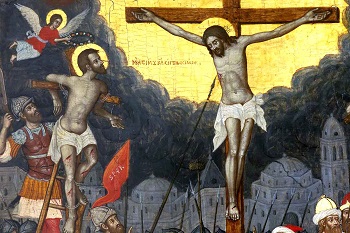
Saint Alphonsus quotes Arnold of Chartres saying this about the Good Thief: "He believed, he repented, he confesses, he preached, he loved, he trusted, he prayed."
John the Baptist said: "Do penance: for the kingdom of heaven is at hand." (Matthew 3:2) A footnote in the Bible says: "Penance: Which word, according to the use of the scriptures and the holy fathers, does not only signify repentance and amendment of life, but also punishing past sins by fasting, and such like penitential exercises."
He confesses by saying: "Neither dost thou fear God, seeing thou art condemned under the same condemnation? And we indeed justly, for we receive the due reward of our deeds; but this man hath done no evil." (Luke 23:40-41)
"Every one therefore that shall confess me before men, I will also confess him before my Father who is in heaven. But he that shall deny me before men, I will also deny him before my Father who is in heaven." (Matthew 10:32-33) We have a duty as Christians to show forth the glory of God. We do not do this mainly by word, but by living the Christian way of life twenty four hours a day, seven days a aweek. "But sanctify the Lord Christ in your hearts, being ready always to satisfy every one that asketh you a reason of that hope which is in you." (I Peter 3:15) When people see the joy that comes from living the Christian way of life, they may ask us where our joy comes from, and we must be ready to give a simple answer.
By his confession, the Good Thief also preached: "but this man hath done no evil."
He also loved, he loved Jesus for Who Jesus is and showed this love by his confession and preaching.
He trusted and prayed: "And he said to Jesus: Lord, remember me when thou shalt come into thy kingdom." (Luke 23:42) By making his prayer of petition to Jesus, he trusted Jesus to care for him and his trust was rewarded far more than possibly he suspected: "And Jesus said to him: Amen I say to thee, this day thou shalt be with me in paradise." (Luke 23:43)
Let us imitate the Good Thief through our whole lives. Let us look forward and begin this imitation now, for like the Good Thief, we may have not begun well. However, let us remember what the holy Cure of Ars says: "Not all the saints began well, but they ended well." Let us also remember Scripture: "For he saith: In an accepted time have I heard thee; and in the day of salvation have I helped thee. Behold, now is the acceptable time; behold, now is the day of salvation." (II Corinthians 6:2) Now is the time to begin imitating the last hours of the Good Thief.
Let us begin by believing all that Jesus teaches us through His holy Church as we confess in the Apostle's Creed, which is a summary of our Faith. Christianity is not a cafeteria where we can pick and choose what we believe, but a way life, which we either adopt wholly or we rejected it. Jesus sent out His Apostles with the following command: "Teaching them to observe all things whatsoever I have commanded you: and behold I am with you all days, even to the consummation of the world." (Matthew 28:20)
Let us also repent of our sins. Saint John reminds us (I John 1:10): "If we say that we have not sinned, we make him a liar, and his word is not in us." And Saint Paul: "For all have sinned, and do need the glory of God." (Romans 3:23) Repentance means not just acknowleding our sin, but following the advice of Jesus: "Go, and now sin no more." (John 8:11) Repentance includes conversion, which is a complete change of customs and habits from our lax and sinful ways to a life of virtue.
And let us confess and preach. We do this mainly by living the Christian way of life, for actions speak louder than words. God will open opportunties to say a good word to someone, so let us watch for these opportunties.
Saint Peter (I Peter 4:8): "But before all things have a constant mutual charity among yourselves: for charity covereth a multitude of sins." Charity means love of God na dlove of our neighbor for the love of God. Let us also remember "God is love." (I John 4:8) We are called to love as God loves.
We must place our trust in Almighty God, surrendering our lives completely and without reserve into His hands. "Cast thy care upon the Lord, and he shall sustain thee: he shall not suffer the just to waver for ever." (Psalms 54:23) Saint Peter (I Peter 5:7): "Casting all your care upon him, for he hath care of you." Let us imitate Jesus in His Passion, when he told His Father: "Father, into thy hands I commend my spirit." (Luke 23:46.
And finally let us pray, and let our prayer come from the heart. We are not told how the Good Thief prayed after his conversation with Jesus, but we can be assured that he did. Consider that he prayed while suffering death on the cross, just as our Savior was suffering at the same time. Our cross are miniscule, when compared to the Cross of Christ. Let us remember that there are four ends of prayer, adoration, contrition, petition and thanksgiving. Let us also remember that adoration comes first. We adore God for Who He is. Then we ask His forgiveness of our sins. Only after this should we ask Him for anything, petition should not be our main type of prayer. Let us thank God for everything He sends us, for even tribulations are a blessing, which we do not yet understand.
Knowledge and Wisdom
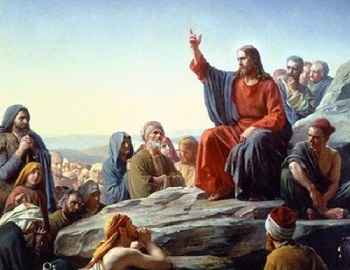
"Some thirty years ago the author Tom Follett wrote a novel entitled "Pillars of the Earth." This was a historical novel set in a fictional town in England called "Kingsbridge." In this novel, the setting is a priory where a cathedral is being built. If you have read the novel you realize that the story takes place over a forty year time span, give or take. And in this time a cathedral is being constructed in Kingsbridge. The primary person who is first in charge of building this cathedral is the character known as "Tom Builder." It is Tom's lifelong dream to build a cathedral. And through misfortune Tom finds himself in Kingsbridge where that dream actually becomes a reality. There is one part in the story where Tom is sitting down with his sons (one his biological son and the other his step-son) well after the construction of the cathedral has begun. In this conversation with his two sons he begins explaining to both of them that he will never see the completion of the cathedral. He goes on to say that they (meaning the sons) will probably not see the completion of the cathedral either. He stated that it will probably be his grandchildren who will be the ones to see the completion of the cathedral. What he said to his sons is the point that I would like to focus on. He said to his two sons that since the cathedral will take an entire lifetime to build, that they should never stop learning. He said to never stop learning because it is through learning that we will be given the tools for what we need to do. I found this to be profound because it is so true. How many of us "learn" because we are told to do so while growing up. When we are younger, we go to school because we are told we must go to school. Learning, in that sense, is not done voluntarily. We go to school. We learn. Because we are told to go to school. "An intelligent heart acquires knowledge, and the ear of the wise seeks knowledge." (Proverbs 18:15)
How many of us make a point to never learn again. We may not phrase it that way but we may say that we will never go to school again. Not if we can help it, anyway. I know I was one of those people. I never did well in school, quite frankly, growing up. As a result, I swore I would never set foot in school again when I graduated high school. Little did I know that God had the seminary set for my future. And the young man who swore that he would never set foot in school again ended up being in the seminary for eight and a half years. But the point is that when we are young most of us fight against it, quite frankly. And why is this? It is because we are being told to learn. We are being forced to learn, so to speak. Our parents tell us we have to go to school. The state tells us we have to go to school. The society says that we have to go to school. In other words, we go to school because we have to. But I know in my own case, at least, I found when I actually did start attending classes in college everything had changed. I discovered I was in that class because I chose to be there. I chose to learn. I chose to be a student. No-one was telling me to take these classes. Certainly, no-one was forcing me to attend these classes. I was taking them because I wanted to take them. I chose to take these classes. And that made all the difference in the world. I did not feel that I was being "forced" to learn. I was choosing to learn. How many people have a similar story to mine?
What "Tom Builder" said to his sons in regards to never stop learning is sound advice for us in a Christian sense as well. How many of us have stopped learning about God? How many of us refuse to learn about God because no-one is compelling us to learn? As children . . . . well, at least when I was growing up . . . . most children took religious instruction. Children were enrolled in catechism classes. Children went to Sunday school. Today, how many children do these things? And even if they do, how many of these children continue to learn about God once they grow up and no-one "compels" them to attend Sunday school or catechism class? Learning about God should be a life-long pursuit. Learning about Scripture should be something we continue to do as long as we live.
"Let the wise hear and increase in learning, and the one who understands obtain guidance." (Proverbs 1:5)
When we learn, we certainly do grow and increase. As Christians, we need to follow God's command but we need to know what God desires for us in our life. So often as we get older we think we know what is best. The problem is that we soon discover that what we actually seek is what we want, what we desire, what we crave in life. Increase in learning about God. Increase in learning about the ways of God. And, most importantly, increase in the knowledge of what God has in store for each one of us. As I like to say that each and every one of us is a unique instrument that God uses for His will. Each and every one of us has a part to play in promoting the Kingdom of God. But it is up to us to be willing and to be open so that we can become the "instrument of God" that we are meant to be.
"The fear of the Lord is the beginning of knowledge; fools despise wisdom and instruction." (Proverbs 1:7)
We need to continue to learn. We need to continue to grow in wisdom. So many of us in today's society seek to grow in the ways of the world. So many of us seek to grow in the world's wisdom. From what I have seen, the "wisdom of the world" is very fickle. What is considered "wise" in one generation is tossed out the next generation. Or vice versa. Seek to grow in the wisdom of God. St James tells us: "If any of you lacks wisdom, let him ask God, who gives generously to all without reproach, and it will be given him." (St James 1:5) Yes, let us ask God. Let us seek God. Let us search for God's wisdom. Let us ask for God to teach us. So many people in today's world stopped seeking wisdom. So many of these people do not ask to be taught. They either do not want to learn or, even worse, they do not believe they need instruction. These people think they know everything. They think they know it all already. I know as I continued taking classes and as I continued learning, I came to understand one thing: the more I came to learn, the more I realized that I did not know. In other words, the learned man realizes that there is always so much more to learn in order to grow in understanding. And this comes from a desire to learn. We have to be the ones to choose to learn, to want to learn. Let us ask God to send the Holy Ghost to instruct us and to help us learn the things that God would have us learn. And let us pray that we be open to this learning. And Our Blessed Lord assured us that this will happen if we are open: "But the Helper, the Holy Spirit, whom the Father will send in my name, he will teach you all things and bring to your remembrance all that I have said to you." (St. John 14:26)"
The Funny Pharmacy
A joyful mind maketh age flourishing: a sorrowful spirit drieth up the bones. - Proverbs 17:22






Frequently Asked Questions

Do you believe that a layman could be elected a Pope, not withstanding discussion of the manner of election?
Yes, a layman can be elected.
For answers to more frequently asked questions, click here: https://www.vaticaninexile.com/frequently_asked_questions.php

The Pope Speaks: July 2020
Thirtieth Anniversary

Thirty years ago fourteen people were in a small town in north east Kansas. What brought these people together was the election of a Pope. The world had been notified of this election, which had been talked about for over a decade and a half in various quarters.
A brief history of this effort is in order. In May of 1976 three priests met with Archbishop Lefebvre to ask him to help with electing a Pope. One of the priests had already approached all of the conservative Cardinals about this proposition, but had been turned away. Bishop Thuc in 1981 consecrated three priests as bishops for the sole purpose of preserving the order of bishop until someone could be restored to the Office of Bishop of Rome, who in turn could reorganize bishops and priests and restores the Offices of Bishop of the new dioceses he would have to erect, due to the apostasy. The new Diocesan Bishops in turn would designate either Pastors or Missionaries. Bishop Peter Martin Thuc wrote in February of 1982: "Therefore, in so far as I am a bishop of the Roman Catholic Church, I judge that the See of the Catholic Church in Rome to be vacant; and it is necessary for me, as bishop, to do all that is needed so that the Catholic Church in Rome endures for the eternal salvation of souls." In the references he refers to the Bull Unam Sanctam in support of this. Unam Sanctam declares: "Indeed we declare, say, pronounce, and define that it is altogether necessary to salvation for every human creature to be subject to the Roman Pontiff." Since a living breathing Pope is a necessary means of salvation so we can obey him, the clergy under Canon 682 (1917 Code) are obliged to provide us with a Pope. The idea of the election of a Pope was common knowledge among Traditionalists at this time, so much so, that the District Superior for one of the American Districts sent out a letter against this idea. Thuc was betrayed when two priests, who had been consecrated bishops, usurped the authority of Bishop of Rome and separated the United States into two Dioceses and appointed themselves, one to the east of the Mississippi and the other to the west.
In spite of these failures a few Catholics remained faithful to the Church, while Traditionalism drifted further away from the Catholic Church, which it claimed to defend. The goal of Traditionalism was to restore 1950's Catholicism, which was merely a whited sepulcher. (Matthew 23:37) What Traditionalists didn't stop and consider is that 1950's Catholicism led to 1960's apostasy at Vatican 2 and in its perfidious spirit.
"Awake, O sword, against my shepherd, and against the man that cleaveth to me, saith the Lord of hosts: strike the shepherd, and the sheep shall be scattered: and I will turn my hand to the little ones." (Zacharias 13:7) Jesus quoted this before His passion warning the Apostles that they would all desert Him. (Matthew 26:31) Jesus, the Shepherd, was struck with His Crucifixion and the Sheep, the Apostles were scattered. Vatican 2 saw the Shepherd, the Vicar of Christ, struck, and the Sheep, the Bishops scattered. The lambs, the faithful, were deserted by their Pastors, who had scattered away from the Church in to apostasy.
These people who gathered in mid July had one thing in common, they had all left the Traditionalist Movement in order to stay with the Catholic Church. The Traditionalist Movement had no true unity in 1990, as it still has no unity today, although the lines are drawn slightly differently. Without a Shepherd, a living, breathing Pope, the sheep and lambs will remain scattered. None of the main positions of the Traditionalists truly has a Pope. Obviously Sedevacantism, which says there is no Pope, has no Pope. Sedeoccupantism, which claims Francis as Pope, resists him, really doesn't have a Pope. For them, when Rome speaks, is it Rome that has spoken, the debate is on about whether or not what has come is Traditional or flows from the Spirit of Vatican 2. Sedeprivationism, which awaits Francis' conversion like the Sedeoccupantists claims that Francis is really only a Pope-elect until his conversion, his heresies being an obstacle to accepting election. Pope Leo XIII wrote in Satis Cognitum, on Church unity: "But the Episcopal order is rightly judged to be in communion with Peter, as Christ commanded, if it be subject to and obeys Peter; otherwise it necessarily becomes a lawless and disorderly crowd." Indeed Traditionalism is just such a lawless and disorderly crowd.
In the fall of 1987, the movement to elect a Pope became stirred up in the United States, and then spread into Europe. It is not known how many were supporting the idea, but many well known among Traditionalists supported the idea. Even Malachi Martin showed interest. Articles were written and circulated throughout the world among the sedevacantists. Meetings were held among interested people, when possible. Finally two people decided a book needed to be written in May of 1989.
However, also in the fall of 1987 a new proposition arose, Joseph Cardinal Siri had been elected in the 1963 conclave and in both 1978 conclaves, but forced not to accept election, becoming therefore a pope-elect. A man elected Pope between the time he has the necessary votes and he either accepts or rejects election is a pope-elect with no authority until he accepts. Until the pope-elect rejects the election, another election cannot be made. Therefore this proposition invalidates Paul VI and Vatican II, as no decree had been approved under John XXIII. This theory also invalidates John Paul I, John Paul II the Great Deceiver and their successors. After Siri died on May 2, 1989, the proposition was amended to include the 1958 conclave and it was claimed he had accepted election, but was forced not to be proclaimed Pope. On October 26, 1958 white smoke rose. United Press International announced that Alfredo Cardinal Ottaviani had been elected Pope. Then the smoke turned black and the Vatican Press Service announced no Pope had been elected. On October 28, Angelo Roncalli appeared as the second man to claim to be John XXIII, the first from the Western Schism. All we are certain of is that something occurred on October 26th, 1958, which clouds the election of Roncalli two days later, thus placing doubt on Vatican II and all that followed.
About the time Siri and any claim he had to the Papacy died on May 2nd, 1989, two people began writing a book to call for an election. On January 25, 1990, Will the Catholic Church Survive the Twentieth Century? was published, calling for the election of a Pope. It was sent around the world to all sedevacantists listed in Radko Jansky's Traditionalist Catholic Directory. Instead of the desired effect to rally support for the election of a Pope, instead those who supported an election started going away, much like the Gospel about the great supper, where those invited made excuses. (Luke 14:16ff) Letters were written and phone calls made to encourage people to participate and a summons was sent out in early May. More excuses were made. Some wanted delay, but had no good reason to delay. We had already waited over three decades, ten times longer than the second longest interregnum in history. Why should we wait longer? The Church had been reduced to a handful so small a little child can name them. (Isaias 10:19) The Second Council of Lyons declared: "We learn from the past how heavy are the losses sustained by the Roman church in a long vacancy, how perilous it is; we see this all too clearly when we wisely consider the crises undergone." (Paragraph 2, 1247AD)
Finally eleven people assembled by July 15, 1990. Two arrived that day advocating delay, but had no reason for asking for delay. They left for their motel in the evening stating that they would consider whether to vote on the next day or not. They left a message on the phone at the place of election, that they had decided not to participate. Another departed that morning before voting. Eight assembled, and six voted, the other two being too young to vote. Shortly after the election was completed three men arrived, who had supported an election to see if we had proceeded. They never indicated any desire for holding off the election and knew exactly how long it would take to travel to the place of the election. Why put off the trip to the last minute?
On July 16, 1990, We were elected as Pope, taking the name of Michael. At the time We already knew there would be little support for the Papacy, as Traditionalists apparently don't really want a Pope they must obey, but as someone observed would rather be their own little popes of their own little churches.
Traditionalists appeal to epikeia to justify their actions. The story that is told to demonstrate this principle is this. In a walled city, the mayor has ordered that the gate not be opened without his permission. The mayor is gone. A fire breaks out inside the walls of the city, threatening to kill the inhabitants. And so the officials decide to throw the gates open to save the people. Thus the story ends. Traditionalists threw the gates open and left the Church. Rather than forming a bucket brigade to put out the fire, they went out and started founding their own little cities, their own little churches. They left the fire to practically burn down the city, leaving few stragglers, who wanted to come back and rebuild the city.
These stragglers assembled and tried to summon the other former citizens back to begin rebuilding the city. Few even showed any interest, and it remains this way today. Indeed this has been prophesied. The prophet Isaias wrote: "And they that remain of the trees of his forest shall be so few, that they shall easily be numbered, and a child shall write them down." (Isaias 10:19) And Jesus said (Luke 18:7-8): "And will not God revenge his elect who cry to him day and night: and will he have patience in their regard? I say to you, that he will quickly revenge them. But yet the Son of man, when he cometh, shall he find, think you, faith on earth?"
As Pope We have noticed that the desire to restore a lax form of Catholicism remains deep in the heart of almost all, who have come to be with the Church for a time. In 1997 We first quoted Saint Augustine, because We want to bring fervor to these worldly people: "A man who progresses during prosperity has to await times of adversity before he can learn what progress he has made. When he is rich in the goods of this world, he may be certain that he places no stock in them; but when they are taken from him, he then discovers if they had a hold on him, for generally, when we have them we think that we don't love them, but when we don't have them, then we discover that we yearn for them. The criterion is this-if we do not grieve when our goods are absent, then only can we be certain that we did not set our heart on them when they were present." Then We wrote: "Maybe some of us need a good fire to show us how materialistic we are. However, We would prefer that all would voluntarily detach from materialism rather than require God to remove our material goods by force to get the point across. But, if you do not want to detach voluntarily We shall pray that God gives you a fire or flood or some other natural event, because this is far better than losing your soul."
We penned a Prayer for the Restoration of the Mass:
"The prophet Daniel prophesied, and in the half of the week the victim and the sacrifice shall fail: and there shall be in the temple the abomination of desolation." (Daniel 9:27) "And strength was given him against the continual sacrifice, because of sins: and truth shall be cast down on the ground." (Daniel 8:12) These terrible prophecies have come to pass. We long to again participate in the unbloody sacrifice of the Mass and receive Thy Body and Blood in Holy Communion. We promise to learn the truths of the Faith, which have been cast down on the ground and to turn away from sin, which has given Antichrist power against the continual sacrifice and to return to Thee, as Isaias bids us. We promise with the help of Thy grace to do all in our power to remove any obstacle in ourselves to the worthy reception of Thy Sacred Body and Blood in the Most Holy Eucharist. Until this holy day comes, when our desire can be fulfilled in participation at the Holy Sacrifice of the Mass, We desire to receive Thee spiritually, who cannot receive Thee sacramentally. Amen"
Indeed the prophecy of Daniel has been fulfilled: "And when they shall have fallen they shall be relieved with a small help: and many shall be joined to them deceitfully." (Daniel 11:34) Saint John (I John 2:19) tells us: "They went out from us, but they were not of us. For if they had been of us, they would no doubt have remained with us; but that they may be manifest, that they are not all of us."
On the day of the election after we returned to Our home, one of the electors said: "Maybe all we did is save the Apostolic Succession." And indeed, the Pope truly possesses Apostolicity, that is the mission of the Apostles, the authority of Saint Peter and the right to receive the Order of Bishop to accompany the Office of Bishop of Rome.
of the virtues necessary in the Papacy is perserverance. We are the third longest reigning Pope in history after Peter (34 or 37 years) and Pius IX (31½ years). No Antipope reigned for thirty years, the longest reigning Antipope being John Paul II the Great Deceiver (26½ years).
We live in trying times and much could be said on this. We ask for your prayers and your help to spread the true Faith to the world as We enter Our thirty-first year.
With Our Apostolic Blessing and prayers,
Michael, by the grace of God, Pope


Saint Mark the Ascetic
On The Spiritual Law
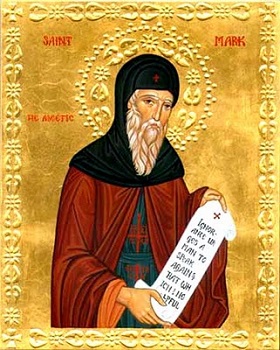
1. Because you have often asked what the Apostle means when he says that 'the law is spiritual’ (Rom. 7:14), and what kind of spiritual knowledge and action characterizes those who wish to observe it, we shall speak of this as far as we can.
2. First of all, we know that God is the beginning, middle and end of everything good; and it is impossible for us to have faith in anything good or to carry it into effect except in Christ Jesus and the Holy Spirit.
3. Everything good is given by the Lord providentially; and he who has faith that this is so will not lose what he has been given.
4. Steadfast faith is a strong tower; and for one who has faith Christ comes to be all.
5. May He who inaugurates every good thing inaugurate all that you undertake, so that it may be done with His blessing.
6. When reading the Holy Scriptures, he who is humble and engaged in spiritual work will apply everything to himself and not to someone else.
7. Call upon God to open the eyes of your heart, so that you may see the value of prayer and of spiritual reading when understood and applied.
8. If a man has some spiritual gift and feels compassion for those who do not have it, he preserves the gift because of his compassion. But a boastful man will lose it through succumbing to the temptations of boastfulness.
9. The mouth of a humble man speaks the truth; but he who speaks against the truth is like the servant who struck the Lord on the face (cf. Mark 14:65).
10. Do not become a disciple of one who praises himself, in case you learn pride instead of humility.

Saints from East and West
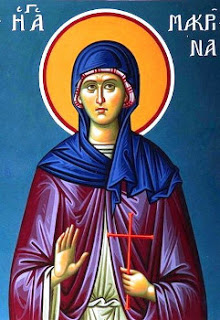
July 19 - Saint Macrina.
The Monastic Macrina, Sister of Sainted-Hierarchs Basil the Great and Gregory of Nyssa, was born in Cappadocia at the beginning of the fourth century. Her mother, Emilia, saw in a dream an Angel, naming her yet unborn one Thekla, in honour of the holy First-Martyress Thekla. Saint Emilia fulfilled the will of God and named her daughter Thekla. Another daughter that was born they named Macrina, in honour of a grandmother who suffered during the time of persecution against Christians under the emperor Maximian Galerius.
Besides Macrina, in her family were nine other children. Saint Emila herself guided the upbringing and education of her elder daughter. She taught her reading and writing in the Scriptural books and Psalms of David, selecting those examples from the Sacred books which instructed of a pious and God-pleasing life. Saint Emilia trained her daughter to attend church services and make private prayers. Macrina was likewise taught the proper knowledge of domestic governance and various handicrafts. She was never left idle and did not participate in childish games or amusements.
When Macrina grew up, her parents betrothed her to a certain pious youth, but the bridegroom soon died. Many young men sought marriage with her, but Macrina refused them all, having chosen the life of a virgin and not wanting to be unfaithful to the memory of her dead fiancee. The Monastic Macrina lived in the home of her parents, helping them fulfill the household tasks as an overseer together with the servants, and she carefully followed after the upbringing of her younger brothers and sisters. After the death of her father she became the chief support for the family.
When all the children grew up and left the parental home, Saint Macrina convinced her mother, Saint Emilia, to leave the world, to set their slaves free, and to settle in a women's monastery. Several of their servants followed their example. Having taken monastic vows, they lived together as one family, they prayed together, they worked together, they possessed everything in common, and in this manner of life nothing distinguished one from another.
After the death of her mother, Saint Macrina guided the sisters of the monastery. She enjoyed the deep respect of all who knew her. Strictness towards herself and temperance in everything were characteristic of the saint over the course of all her life. She slept on boards and had no possessions. Saint Macrina was granted a gift of wonderworking. There was an instance (told by the sisters of the monastery to Saint Gregory of Nyssa after the death of Saint Macrina), when she healed a girl of an eye affliction. Through the prayers of the saint, at her monastery in times of famine there was no shortage of wheat, necessary for the use of the sisters.
Saint Macrina died in the year 380, after a final sigh of exalting prayers of thanks to the Lord for having received of Him blessings over all the course of her life. She was buried in the same grave with her parents.
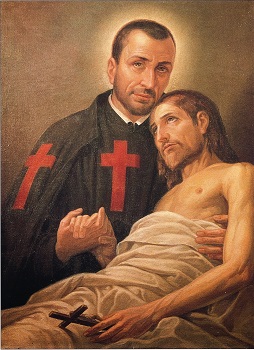
July 18 - St. Camillus de Lellis.
Camillus de Lellis was born in 1550 at Bocchianico in the Abruzzi, when his mother was nearly sixty. He grew to be a very big man - 6 feet 6 inches tall and the rest in proportion - and when he was seventeen he went off with his father to fight with the Venetians against the Turks; but soon he had contracted that painful and repulsive disease in his leg that was to afflict him for the rest of his life.In 1571 he was admitted to the San Giacomo hospital for incurables at Rome, as a patient and servant; after nine months he was dismissed, for his quarrelsomeness among other things, and he returned to active service in the Turkish war. Though Camillus habitually referred to himself as a great sinner, his worst disorder was an addiction to gambling that continually reduced him to want and shame. In the autumn of 1574 he gambled away his savings, his arms, everything down to the proverbial shirt, which was stripped off his back in the streets of Naples.
The indigence to which he had reduced himself, and the memory of a vow he had made in a fit of remorse to join the Franciscans, caused him to accept work as a labourer on the new Capuchin buildings at Manfredonia, and there a moving exhortation which the guardian of the friars one day made him completed his conversion. Ruminating on it as he rode upon his business, he at length fell on his knees, and with tears deplored his past unthinking life, and cried to Heaven for mercy. This happened on Candlemas day in the year 1575, the twenty-fifth of his age; and from that time he never interrupted his penitential course. He entered the novitiate of the Capuchins, but could not be admitted to profession on account of the disease in his leg. He therefore returned to the hospital of San Giacomo and devoted himself to the service of the sick. The administrators, having been witnesses to his charity and ability, after some time appointed him superintendent of the hospital.
In those days the spiritual and physical conditions in hospitals were such as it is now difficult to credit, conditions largely due to the necessity of employing any staff that could be got, even criminals. Camillus, grieving to see the unscrupulousness and slackness of hired servants in attending the sick, formed a project of associating for that office some of the attendants who desired to devote themselves to it out of a motive of charity. He found several persons so disposed, but met with great obstacles in the execution of his design, particularly from that jealousy and suspicion that are so often provoked by disinterested reformers. To make himself more useful in spiritually assisting the sick, he resolved, with the approval of his confessor, Saint Philip Neri, to receive holy orders, and was ordained by the vicegerent of Rome, Thomas Goldwell, Bishop of Saint Asaph, the exiled last bishop of the old English hierarchy. A certain gentleman of Rome named Fermo Calvi gave him an annuity as his title of ordination. Camillus decided to sever connection with San Giacomo and start on his own, though to do so was contrary to the advice of Saint Philip; so with two companions he laid the foundations of his congregation: he prescribed certain short rules, and they went every day to the great hospital of the Holy Ghost, where they served the sick with so much affection and diligence that it was visible to all who saw them that they considered Christ Himself as lying sick or wounded in his members.
They made the beds of the patients, paid them every office of charity, and by their exhortations disposed them for the last sacraments and a happy death. The founder had powerful adversaries and great difficulties to struggle with, but by confidence in God he conquered them all. In 1585 he hired a larger house, and the success of his undertaking encouraged him to extend his activities: so he ordained that the members of his congregation should bind themselves to serve persons infected with the plague, prisoners, and those who lie dying in private houses; later, in 1595 and 1601, some of his religious were sent with the troops fighting in Hungary and Croatia, thus forming the first recorded "military field ambulance." Nothing can deprive Henry Dunant of his honour for the part he played in the foundation of the International Red Cross; but the memory should not be lost of those who before him concerned themselves with the wounded in battle, who include Saint Camillus de Lellis as well as Florence Nightingale.
In 1588 Camillus was invited to Naples, and with twelve companions founded there a new house. Certain galleys having the plague on board were forbidden to enter the harbour, so the Ministers of the Sick (for that was the name they took) went on board, and attended them: on which occasion two of their number died of the pestilence, and were the first martyrs of charity in this institute. Saint Camillus showed a like charity in Rome when a pestilential fever swept off great numbers, and again when that city was visited by a violent famine. In 1591 Gregory XIV erected this congregation into a religious order, for perpetually serving the sick. They are now reckoned as clerks regular, are about equally divided between priests and lay-brothers, and follow their original work of nursing all sick persons without distinction, privately or in hospitals, or elsewhere. The founder was, as has already been said, himself afflicted with many corporal sufferings: the disease in his leg for forty-six years; a rupture for thirty-eight years; two sores in the sole of one of his feet, which gave him great pain; and, for a long time before he died, a distaste for food and inability to retain it. Under this complication of infirmities he would not suffer anyone to wait on him, but sent all his brethren to serve others. When he was not able to stand he would creep out of his bed, even in the night, and crawl from one patient to another to see if they wanted anything. Among many evils and dangers which the zeal of Saint Camillus prevented, his attention to the care of the dying soon made him discover that in hospitals many were buried alive. Hence he ordered his religious to continue the prayers for souls yet in their agony for at least a quarter of an hour after they seemed to have drawn their last breath, and not to suffer their faces to be covered so soon as was usual, lest those who were not dead should be smothered. Saint Camillus saw the foundation of fifteen houses of his brothers and eight hospitals, and Almighty God acknowledged his zeal and selflessness by the spirit of prophecy and the gift of miracles, and by many heavenly communications and favours.
The saint laid down the canonical leadership of his order in 1607. But he assisted at the general chapter in Rome in 1613, and after it, with the new superior general, visited the houses, giving them his last exhortations. At Genoa he was extremely ill. He recovered so as to be able to finish the visitation of his hospitals, but soon relapsed, and his life was now despaired of. He received viaticum from the hands of Cardinal Ginnasi, and when he received the last anointing he made a moving exhortation to his brethren; he expired on July 14, 1614, being sixty-four years old. Saint Camillus de Lellis was canonized in 1746, and was, with St John of God, declared patron of the sick by Pope Leo XIII, and of nurses and nursing associations by Pope Pius XI.


Books to feed your faith!
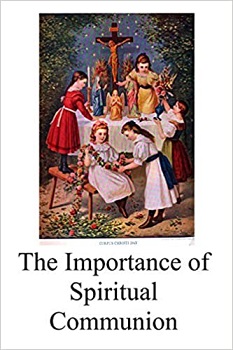
The Importance of Spiritual Communion
Kindle $2.99 / Paperback $5.99
If we cannot receive Holy Communion actually, then let us do so spiritually. These prayers and instructions have been gathered from the Saints and other venerated spiritual writers. Spiritual Communion has been a part of the spiritual life for decades. Growing up I was instructed to make a Spiritual Communion, when I could not go to Communion such as when I assisted at a second Mass. The same is true if one finds oneself at Mass, but not fasting. There are times coming, when it will be difficult, if not impossible to assist at the Holy Sacrifice of the Mass. We should be prepared for such times.
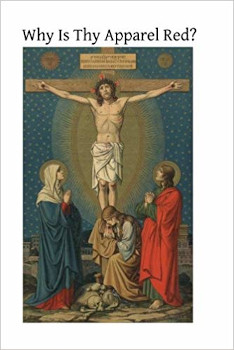
Why Is Thy Apparel Red?: Or the Glories of the Precious Blood
$14.95
Saint Catherine of Siena bids us fill our memory with thoughts of the Precious Blood of Jesus. This the writer has attempted to do in the following pages. Those who thirst for the love of God and for the salvation of souls, yet feel oppressed by the consequences of their sins, and are diffident about the efficacy of their prayers, will find in the devotion to the Blood of our Redeemer a source of consolation and encouragement altogether too little known and appreciated. The Church elevates the chalice every morning at Mass for our adoration and as a propitiation for our sins, and her liturgical prayers are replete with invocations to the Precious Blood, to awaken our confidence in this Blood of the Atonement. "Having therefore, brethren, a confidence in the entering into the holies by the blood of Christ" (Heb. X, 19). Our Eucharistic Lord is glorified in the Blessed Sacrament by the devotion to His Divine Blood, trampled under foot in the Passion, but now acclaimed with joy by us, the chosen people of the New Law, as the Price of our Redemption. IIis Blood be upon us and upon our children for the sanctification of our souls!
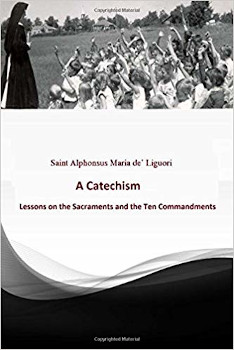
Catechism: Lessons on the Sacraments and the Ten Commandments
$14.95
Dearly beloved Christian, impress well on your mind the mysteries of your holy faith, and the things that are necessary for making your confessions and Communions with fruit. And after having learned them well, repeat them at home and teach them to others. You will thus give great pleasure to Jesus Christ; and with a little trouble you shall share in and gain all the good which, through your instructions, others shall afterwards do. In order to save your soul, it is not enough for you to be made a Christian by the sacrament of Baptism, which you have received; it is, moreover, necessary for you to know the mysteries of faith, to observe the commandments of God and the Church, and to receive the holy Sacraments with the requisite dispositions. First, you must believe that there is one only God, and that He is omnipotent; that is, that He has created the heavens, the earth, the angels, men, yourself, and all things. God is immense; that is, He is in heaven, on earth, and in all places. God is just; He punishes sinners, and rewards the good; He sends to hell all who die in mortal sin, and gives the glory of heaven to them who die in His grace. You must believe in the most holy Trinity; that is, that in this infinite, eternal, omnipotent, immense, and just God, there are three divine persons, who are called Father, Son, and Holy Ghost; three persons, and only one God. You must believe that the Son of God, that is, the second person of the most holy Trinity, was made man in the most chaste womb of the Virgin Mary by the operation of the Holy Ghost; that He was born an infant, in a stable, and that He died on a cross in order to save our souls; and that He is called Jesus Christ, true God and true man; that, after death, He arose again the third day from the dead, that He ascended into heaven, and sits at the right hand of the Father; that, on the day of the general judgment, He will come to judge the whole world; that He will send to hell the souls and bodies of all who have died in mortal sin, and that He will bring with Him into heaven the souls and bodies of them who have died in His grace. You must believe that Jesus Christ has instituted the holy Sacraments, by means of which He pardons our sins and sanctifies our souls, by applying to us His own merits and the efficacy of His precious blood. And all these truths of faith you must believe, not because the priest teaches them to you, but because Jesus Christ has taught them to His Church, and His holy Church teaches them to us. And by this holy Church I mean the Pope, who teaches all the faithful, or the holy pastors along with the Pope, who is their head.
Charity: A Commentary on I Corinthians 13 by Saint Alphonsus
$9.99 paperback / $0.99 Kindle
Charity is patient, is kind: charity envieth not, dealeth not perversely; is not puffed up; Is not ambitious, seeketh not her own, is not provoked to anger, thinketh no evil; Rejoiceth not in iniquity, but rejoiceth with the truth; Beareth all things, believeth all things, hopeth all things, endureth all things. (I Corinthians 13:4-7) Saint Paul wrote wonderfully about charity in the 13th chapter of First Corinthians. Saint Alphonsus takes these words and gives a simple view of the Catholic way of life and an excellent introduction into the spiritual life. This is excerpted from his work, The Holy Eucharist, which has been excerpted from The Complete Works of Saint Alphonsus, which was compiled and translated by Father Eugene Grimm. (1835-1891)
For More Good Traditional Catholic Books:


Alma Mae's Summer Squash Bread
3 eggs, beaten
2 cups white sugar
1 cup vegetable oil
2 teaspoons vanilla extract
3 cups all-purpose flour
3 teaspoons baking powder
2 teaspoons ground cinnamon
2 teaspoons ground nutmeg
2 cups shredded summer squash
Directions
In a large bowl, use an electric mixer to beat the eggs until fluffy. Beat in the sugar, oil, and vanilla. Gradually mix in the flour, baking powder, cinnamon, and nutmeg. Fold in the squash. Transfer to the prepared baking dish.
Bake 45 minutes in the preheated oven, until a knife inserted in the center comes out clean.
German Cucumber Salad

Prep: 20 minutes
Ready In: 8 hours
"A traditional German favorite that I have loved since I was a child. This recipe is quick, easy, and delicious. Substitute cider vinegar for a different flavor. I prefer to leave the skins on the cucumbers for more texture and flavor, but they can also be peeled prior to slicing if desired. Flavor is best when marinated for several hours before serving."
Ingredients
2 large cucumbers, sliced thin
1/2 onion, sliced thin (optional)
1 teaspoon salt
1/2 cup sour cream
2 tablespoons white sugar
2 tablespoons white vinegar
1 teaspoon dried dill
1 teaspoon dried parsley
1 teaspoon paprika
Directions
Spread cucumbers and onion on a platter; season with salt and let rest for 30 minutes. Squeeze excess moisture.
Stir sour cream, sugar, vinegar, dill, and parsley together in a large bowl.
Fold cucumber and onion slices into the sour cream mixture.
Refrigerate 8 hours to over night; garnish with paprika to serve.

Video sermons and instructions: Timeless timely truths for living the Faith
Precious Blood of Jesus 2012
Ninth Sunday after Pentecost
The Necessity of Mortification
Christ the King Library: The Man Who Fought the Devil - Chapter 1

Encouragement for Today
Therefore encourage one another and build one another up.... I Thessalonians 5:11
We believe...
that through our assorted podcasts, audio downloads and devotional blogs, you will find an assorted Treasure Chest of...
Sermons
Devotionals
Scripture Studies
Catechism Lessons
Daily Blogs
...that will be a help in your faithful walk with the Lord.
LEARN MORE AT THE ENCOURAGEMENT FOR TODAY WEBSITE: https://www.encouragementfortoday.com

RETHINKING JUNK DNA

“I will praise thee; for I am fearfully and wonderfully made: marvellous are thy works; and that my soul knoweth right well.”
Psalm 139:14
At the time of the Scope’s Trial of 1925, several organs of the body were labeled as ‘vestigial’. By this, it was meant that the organ has no purpose and has been ‘left behind’ by the onward march of evolution. Examples of such organs are the coccyx and the appendix. Today, both of these are known to have actual functions and are, hence, not vestigial. All of the other systems identified during the Scope’s Trial as vestigial have now been found to have a use. Many scientists – including many evolutionists – would now suggest that an organ labeled as vestigial is simply one for which the purpose has not yet been found.
Similar arguments have been made about parts of DNA, which have been labeled as Junk DNA because they have no known purpose. Scientists are now casting doubt on the ‘junk’ nature of such DNA segments. Indeed, searching for junk DNA on Wikipedia will lead you to an article entitled Non-Coding DNA. But scientific articles are showing that these DNA segments are probably not non-coding, but the purpose of the coding is not yet known. An example of this is a recent article, showing that mutations in a so-called non-coding section could actually cause genetic illnesses such as autism. Researchers actually made predictions of what such mutations would cause and then demonstrated that these predictions seemed to be correct. Such segments of DNA are not junk, nor even non-coding. We just might not have discovered their purpose yet.
Prayer: Thank You, Lord, that I am fearfully and wonderfully made, according to Your purposes. Amen.

Catechism Catch-Up
The Third Commandment Lesson 8

Required Obligations Given By The Church
Keep The Sabbath Sunday Holy
“In the Scriptures keeping holy the Sabbath means a cessation from bodily labor and from business, as is clear from the following words of the Commandment: Thou shalt do no work on it.” (Exodus 20:10). -Catechism of the Council of Trent
This would also include include your family and or those who you employ and any animals you may have.
Thou shalt do no work on it, thou nor thy son, nor thy daughter, nor thy manservant, nor thy maidservant, nor thy beast, nor the stranger that is within thy gates. (Exodus 20:10)
We are to Sanctify the Sabbath Sunday
Observe the day of the Sabbath, to sanctify it, as the Lord thy God hath commanded thee. (Deuteronomy 5:12)
“….it would have been sufficient to say “Observing the day of the Sabbath” but it added, and sanctify it; and these additional words prove that the Sabbath is a sacred to religion, set apart for works of piety and devotion.
We sanctify the Sabbath fully and perfectly, therefore, when we offer to God works of piety and religion. This is evidently the Sabbath, which Isaiah calls delightful.
If thou turn away thy foot from the Sabbath, from doing thy own will in my holy day, and call the Sabbath delightful, and the holy of the Lord glorious, and glorify him, while thou dost not thy own ways, and thy own will is not found: to speak a word:” (Isaiah 58:13)- Catechism of the Council of Trent
Notice that it says our “thy own will.” That is thy own pleasures. Going to professional games not only is not sanctifying the day unto the Lord, but it is keeping others who have to work at the stadiums, golf course etc. from setting the Lords day apart for God. The same goes for eating out on Sundays, going to the movies on Sunday, grocery shopping, going to gas stations etc.
When examining our conscience the “Blessed be God” says, “It is necessary that we tell in confession, as far as we can remember, all the mortal or grievous sins we may have bee guilty of since our last confession, giving the number of times each one has been committed.” It goes on to say, “The following list will help us to know our sins.”
At this point we find a preliminary examination list, a Table of sins against the Commandments. Under the heading “Third Commandment” the question is asked, “Have you bought or sold without necessity?” Put that question side by side with the activities mentioned above and you will find, except for very few occasions, that those activities done on the Sabbath Sunday is mortal sins.
As we continue with the list given for examining our conscience, we come to a list called “Tables of Sins against the Precepts of the Church”. In this list the question is asked: “Have you observed the Sundays and holy days by hearing Mass and avoiding servile works?” Continuing on we see a list of “Nine ways of being accessory to another's sin” in this list number seven says we are accessory to another's sins “by partaking.” We are encouraging others to work on the Sabbath or to be open on the Sabbath. Again, in all these examinations we find that except for a few occasions, those activities mentioned above are mortal sins when being done on the Sabbath Sunday.
We are to Worship on the Sabbath Sunday
Six days shalt thou labor, and shalt do all thy works. But on the seventh day is the Sabbath of the Lord thy God: thou shalt do no work on it, thou nor thy son, nor thy daughter, nor thy manservant, nor thy maidservant, nor thy beast, nor the stranger that is within thy gates. (Exodus 20:9-10)
“From these words we learn that the Sabbath is consecrated to the Lord, that we are required on that day to render Him the duties of religion, and to know that the seventh day is a sign of the Lord's rest.”-Catechism of the Council of Trent
Works Forbidden on the Sabbath Sunday
Thou shalt do no work on it, thou nor thy son, nor thy daughter, nor thy manservant, nor thy maidservant, nor thy beast, nor the stranger that is within thy gates. (Exodus 20:10)
“These words teach us, in the first place, to avoid whatever may interfere with the worship of God. Hence it is not difficult to perceive that all servile works are forbidden, not because they are improper or evil in themselves, but because they withdraw the attention from the worship of God, which is the great end of the Commandment”-Catechism of the Council of Trent
Works Permitted on the Sunday Sabbath
It has already been mentioned that “works of piety, devotion and religion” was acceptable works for a Sunday Sabbath. But let us go into more detail. Piety and devotion would include the works we do with in the Church at mass. The Catechism of the Council of Trent includes “whatever regards the celebration of divine worship, such as the decoration of the altar or church on occasion of some festival and the like.” It goes on to say, “although servile works, they are not prohibited.”
This would include what is called, “The Seven Spiritual Works of Mercy” They are:
-
To admonish sinners.
-
To instruct the ignorant.
-
To counsel the doubtful.
-
To comfort the sorrowful.
-
To bear wrongs patiently
-
To forgive all injuries.
-
To pray for the living and the dead
Saint James says: “Religion clean and undefiled before God and the Father, is this: to visit the fatherless and widows in their tribulation:” (James 1:27)
This verse can be applied to Policemen, Doctors and Nurses, those employed in retirement homes, etc. These are people who are taking care of the basic needs of others.
The Church gives a a guide line under the “Seven Corporal Works of Mercy”. They are:
-
To feed the hungry.
-
To give drink to the thirsty
-
To clothe the naked
-
To visit and ransom the captives
-
To harbor the harborless
-
To visit the sick
-
To bury the dead.
May God help us to desire to put away our own wants and pleasures. May we desire to be faithful in worshiping Him every Sabbath Sunday. And may we be full of Spiritual and Corporal works of mercy.
Living Catholic:
How can I develop a forgiving spirit?
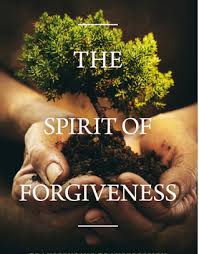
When you’ve been wronged, becoming bitter toward your offender feels like a way to get revenge. However, this response actually harms you more than it harms your offender, because to be bitter is to be in bondage to hatred and wrath. You will experience the destructive consequences of bitterness until you choose to walk in the freedom of forgiveness.
It is not easy to forgive, but God makes it possible through the gift of His grace. (See Hebrews 12:15.) An understanding of the following foundational truths can help you respond to an offense with a forgiving heart.
Consider how much God has forgiven you.
Jesus spoke of a servant who owed a great deal of money to his master. The servant had no hope of repaying the debt, and his master mercifully released him from it. Later that very servant refused to be merciful to someone who owed him a small amount of money. Because of the servant’s choice to not forgive the one who owed him a small debt, the master reinstated the servant’s original debt and punished him severely. (See Matthew 18:21–35.)
Men and women tend to act like the unforgiving servant. We hold onto grudges against one another and ignore, downplay, or excuse the magnitude of our debt of sin against God.
Receiving God’s mercy should motivate you to forgive others. (See Luke 7:40–50.) Truly, any wrong that is done to you falls short of the punishment you deserve because of how deeply your sin has offended God. Forgiveness extends to others the same mercy that God showed you when He forgave the debt of sin you could not pay.
Realize that God is working through the actions of your offender.
Many individuals in Scripture recognized that their offenders were instruments in God’s hand as God worked to accomplish His purposes in their lives. This understanding helped them forgive their enemies and seek God’s redemption in painful situations. (See Genesis 50:20, Job 1:21, and II Samuel 16:5–13.)
If you focus on your offender and the offense, you will have a hard time avoiding bitterness. However, when you view the offense as something God can use for good in your life (to develop your personal character, to open new opportunities, etc.), the significance of both the offender and the offense is greatly diminished, and your response to the offense becomes the major concern.
Jesus Christ is the greatest example of One Who forgave freely. In the midst of His suffering, He was not bitter toward those who beat Him and nailed Him to the cross. Jesus knew they were carrying out the purpose of God for His life, and He prayed, “Father, forgive them, for they do not know what they are doing.” (Luke 23:34). He chose to love instead of hate. He chose to trust and obey His Father rather than take vengeance on His enemies.
When we are offended, we should respond in faith, thanking God for the good purposes He will accomplish through the experience. “give thanks in all circumstances; for this is God’s will for you in Christ Jesus.” (I Thessalonians 5:18).
Recognize the difference between forgiveness and pardon.
Forgiveness and pardon are separate issues. Forgiveness is a personal decision to release an offender from your condemnation. Pardon is a release from the legal penalties of an offense. You can forgive an offender and no longer hate him or wish him harm, but you cannot pardon him unless you have the authority to do so.
For example, if a man killed someone in your family, you could forgive him and want to help him come to repentance, but you could not pardon him. He would still be guilty before God and before the law and would be held responsible for his actions.
In a similar fashion, unless you are in a place of authority, it is not your responsibility to dole out consequences for wrong actions. You can trust God to be just in every situation. “Do not repay anyone evil for evil. . . . Do not take revenge . . . for it is written: “It is mine to avenge; I will repay,” says the Lord. ” (Romans 12:17–19). God works through authority structures (family, church, employment, and government), life circumstances, and final judgment at the end of time to bring justice to offenders. (See Matthew 18:6–7.)
Voluntarily invest in the life of your offender.
In appropriate instances, an important aspect of forgiveness can be the ability to invest in the life of your offender. Jesus said, “For where your treasure is, there your heart will be also.” (Matthew 6:21). When you willingly give to an offender, God can supernaturally give you sincere love toward him.
Ask God how He wants you to demonstrate His love to your offender. You should be able to invest in his life through prayer, words of affirmation, acts of service, or material gifts. “But if thy enemy be hungry, give him to eat; if he thirst, give him to drink. For, doing this, thou shalt heap coals of fire upon his head. Be not overcome by evil, but overcome evil by good.” (Romans 12:20–21).
Whether the offense was intentional or not, forgiveness enables you to have a greater concern for a person after he offends you than you had before he offended you. It opens your heart to cooperating with God’s work in his life, and your sincere love for him allows you to minister to him and help him mature.
Understand that suffering is part of the Christian life.
Scripture states, “For unto you it is given for Christ, not only to believe in him, but also to suffer for him.” (Philippians 1:29). “And all that will live godly in Christ Jesus, shall suffer persecution.” (II Timothy 3:12). “If we suffer, we shall also reign with him. If we deny him, he will also deny us.” (II Timothy 2:12).
As a follower of Christ, you can rejoice in suffering because of the good work God intends to accomplish through it. When offenses usher you into the classroom of trials and tribulations, you have an opportunity to grow in maturity and be filled with a greater understanding of God’s love.
"And not only so; but we glory also in tribulations, knowing that tribulation worketh patience; And patience trial; and trial hope; And hope confoundeth not: because the charity of God is poured forth in our hearts, by the Holy Ghost, who is given to us.” (Romans 5:3–5).
“My brethren, count it all joy, when you shall fall into divers temptations; Knowing that the trying of your faith worketh patience. And patience hath a perfect work; that you may be perfect and entire, failing in nothing. But if any of you want wisdom, let him ask of God, who giveth to all men abundantly, and upbraideth not; and it shall be given him.” (James 1:2–5).
To Learn More Principles For Life Go To: Resources: Principles of Life

Pray for the Holy Father! Pray with the Holy Father!
-
Your prayers are asked this month and every month for the intentions of the Holy Father, Pope Michael
- Pray especially that Holy Ghost inspires and helps us prepare spiritual manuals and days of recollection to make available to all.
-
Keep in your prayers our Podcast Ministry, a new way to reach out in the missionary work of the Church! We ask for prayers for our other activities world wide. We have made good contacts in the Philippines and Japan and ask prayers that these contacts will bear much fruit for the salvation of souls.
-
Be sure to keep St. Helen Catholic Mission in your prayers. Why not go on over to the site now and see what they have to offer and how you might be able to help!
-
Also we ask you to keep in prayer our increasing missionary work in the United States and elsewhere.
-
Your prayers are asked for Father Francis Dominic as he continues the new work in Kissimmee Florida that has been entrusted to him within the Church.
-
Pray for those outside the Church and those who do not know God, that they may see the light of grace and be led safely home to the refuge of the Holy Catholic Church.
-
As always, we also ask that you pray for yourself! Never forget your own state of soul. God is calling you to His service in His love. We know that our Lord can count on you to answer.
-
We are all praying especially for you, too. May you correspond with every grace of God!
-
In what other needs or intentions may we pray for you? Let us know!
-
Let us remember that the Church runs on prayer. Without your prayers, God will not work in hearts and souls to bring them to a knowledge of the truth. (I Timothy 2:4)


To Donate online go to:

To Donate by Mail:
Our address is
Vatican in Exile
829 NE Chester
Topeka, Kansas 66616
Make Checks payable to:
Vatican in Exile

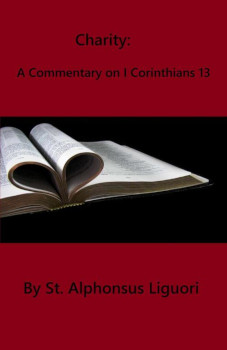








 Follow
Follow


